Marketing Principles Report: Coca Cola's Macro Environment Analysis
VerifiedAdded on 2023/06/05
|7
|917
|317
Report
AI Summary
This report provides a comprehensive macro environment analysis of Coca-Cola, examining the company through the PESTEL framework: political, economic, social, technological, environmental, and legal factors. The analysis delves into how political factors, such as governmental regulations and lobbying efforts, impact Coca-Cola's operations. Economic factors, including revenue fluctuations and global economic conditions, are assessed for their influence on the company's performance. The report also explores social and cultural factors, like health awareness and consumer preferences, and how Coca-Cola responds with product adaptations. Technological advancements and their implications, along with the company's environmental sustainability efforts and legal challenges, are also thoroughly discussed. The report concludes by emphasizing the importance of adapting to these macroeconomic factors for Coca-Cola's continued success in the beverage industry.
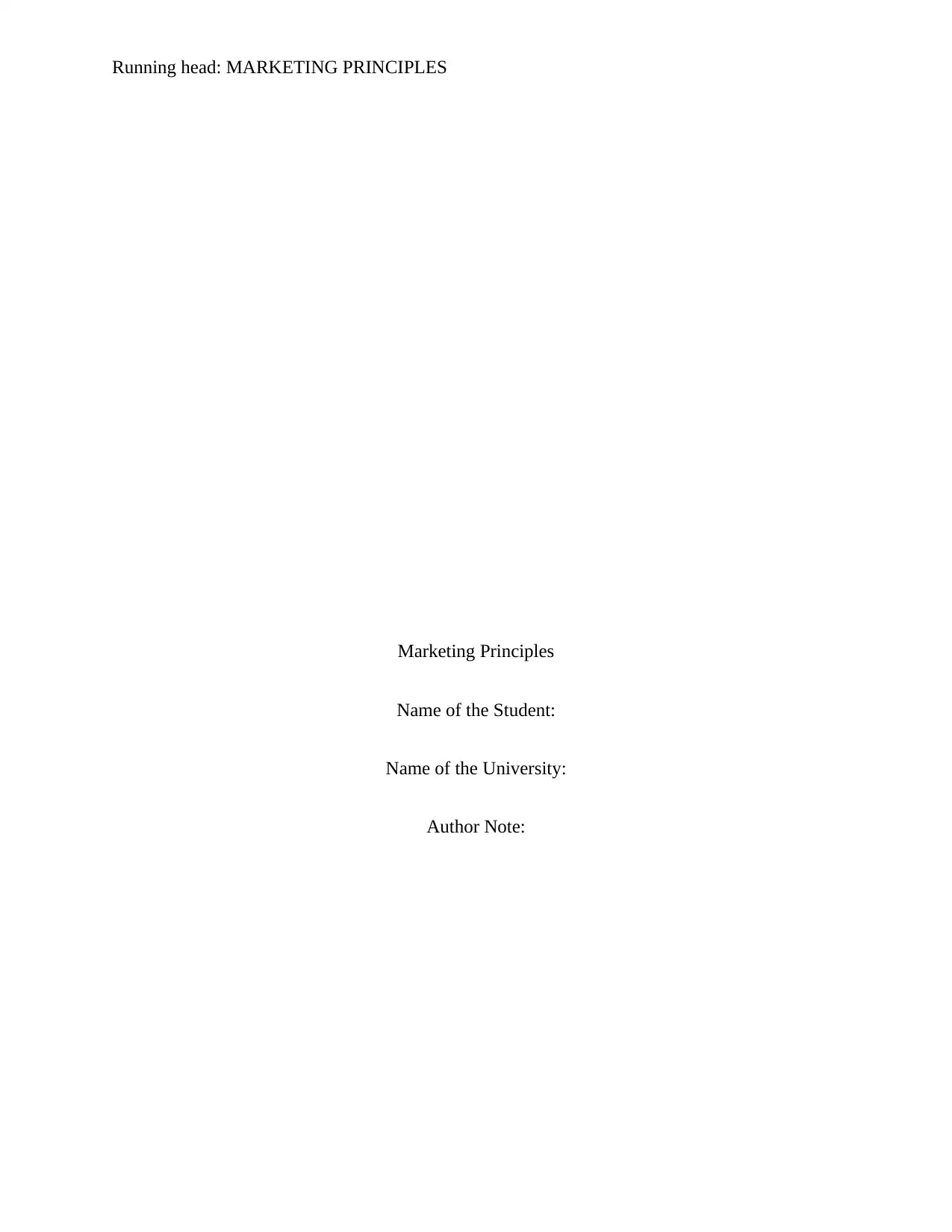
Running head: MARKETING PRINCIPLES
Marketing Principles
Name of the Student:
Name of the University:
Author Note:
Marketing Principles
Name of the Student:
Name of the University:
Author Note:
Paraphrase This Document
Need a fresh take? Get an instant paraphrase of this document with our AI Paraphraser
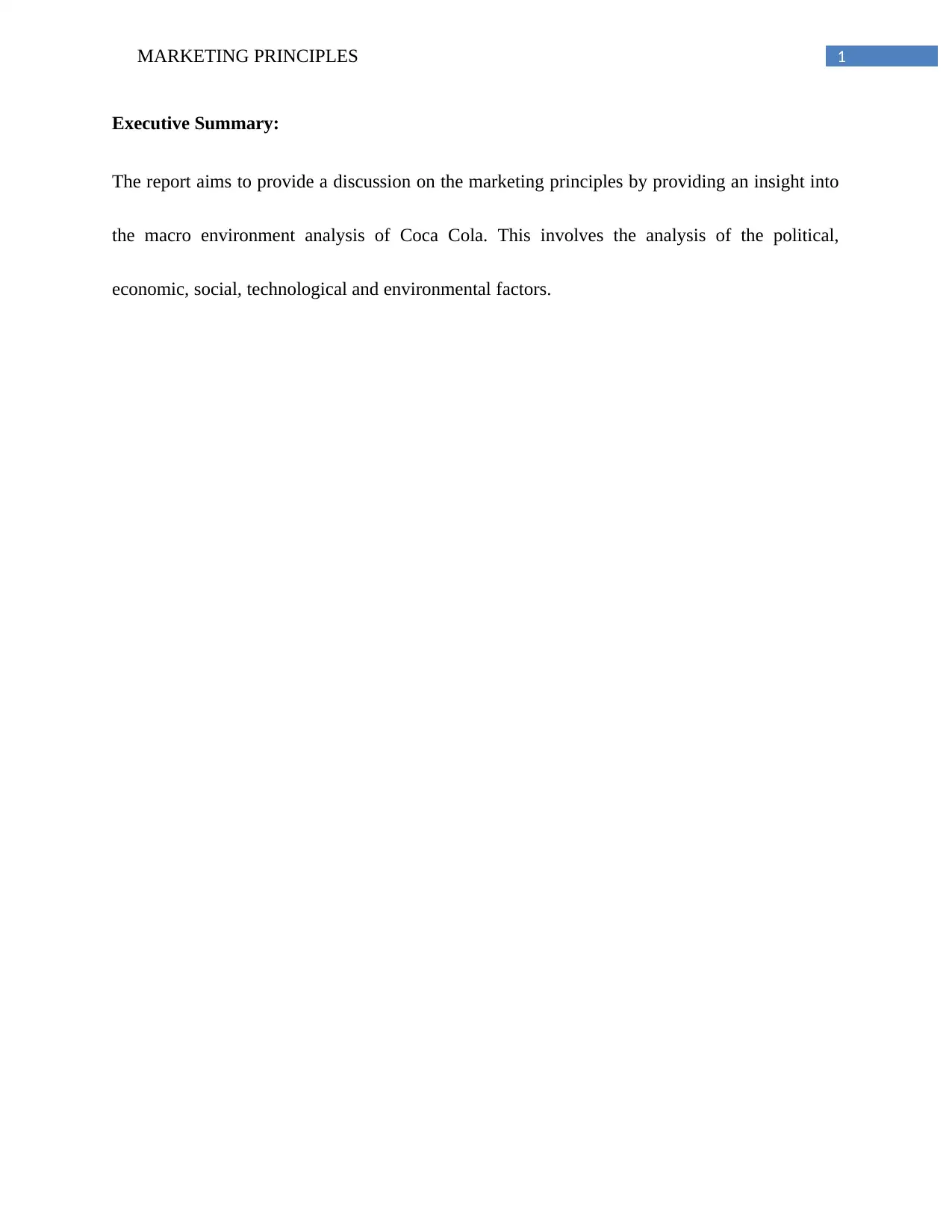
1MARKETING PRINCIPLES
Executive Summary:
The report aims to provide a discussion on the marketing principles by providing an insight into
the macro environment analysis of Coca Cola. This involves the analysis of the political,
economic, social, technological and environmental factors.
Executive Summary:
The report aims to provide a discussion on the marketing principles by providing an insight into
the macro environment analysis of Coca Cola. This involves the analysis of the political,
economic, social, technological and environmental factors.
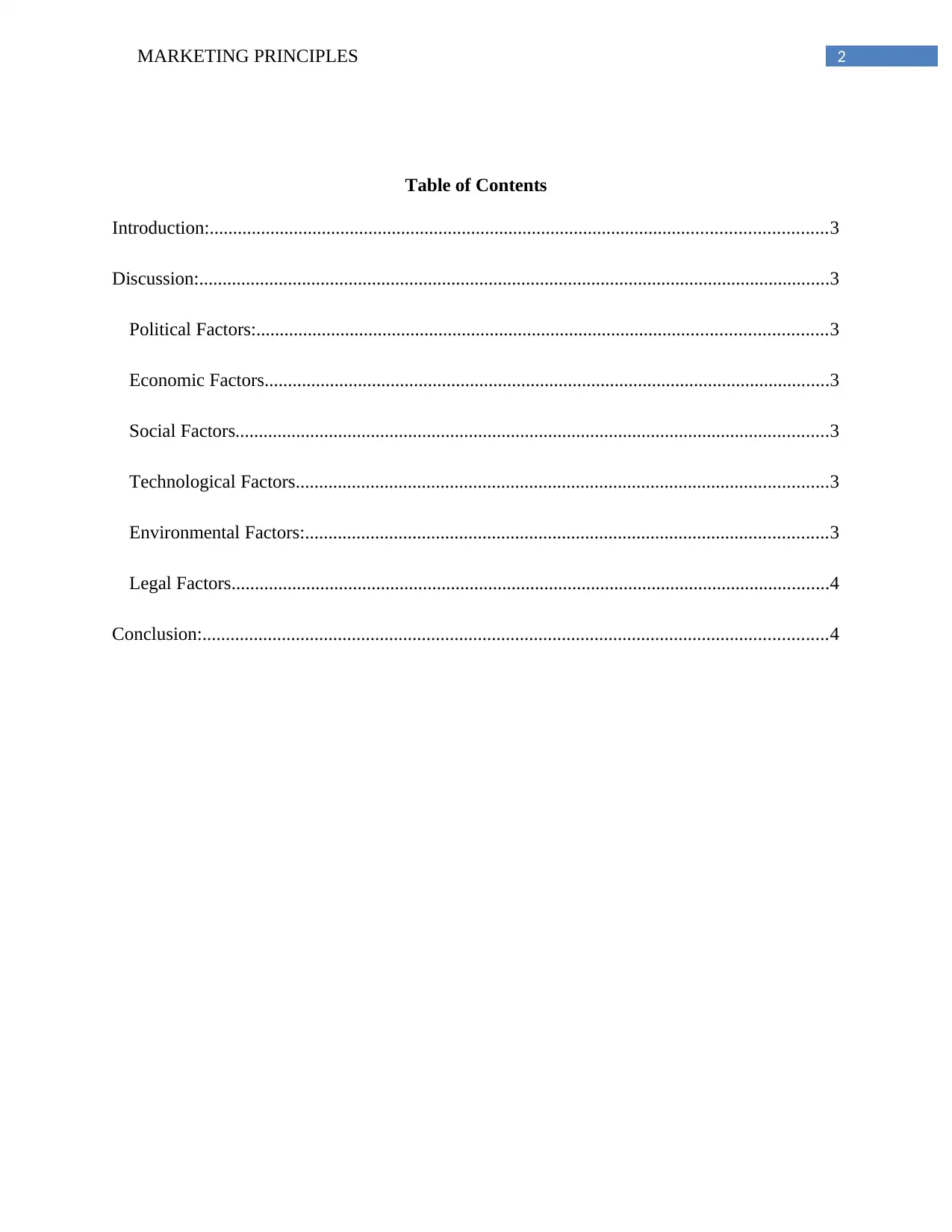
2MARKETING PRINCIPLES
Table of Contents
Introduction:....................................................................................................................................3
Discussion:.......................................................................................................................................3
Political Factors:..........................................................................................................................3
Economic Factors.........................................................................................................................3
Social Factors...............................................................................................................................3
Technological Factors..................................................................................................................3
Environmental Factors:................................................................................................................3
Legal Factors................................................................................................................................4
Conclusion:......................................................................................................................................4
Table of Contents
Introduction:....................................................................................................................................3
Discussion:.......................................................................................................................................3
Political Factors:..........................................................................................................................3
Economic Factors.........................................................................................................................3
Social Factors...............................................................................................................................3
Technological Factors..................................................................................................................3
Environmental Factors:................................................................................................................3
Legal Factors................................................................................................................................4
Conclusion:......................................................................................................................................4
⊘ This is a preview!⊘
Do you want full access?
Subscribe today to unlock all pages.

Trusted by 1+ million students worldwide
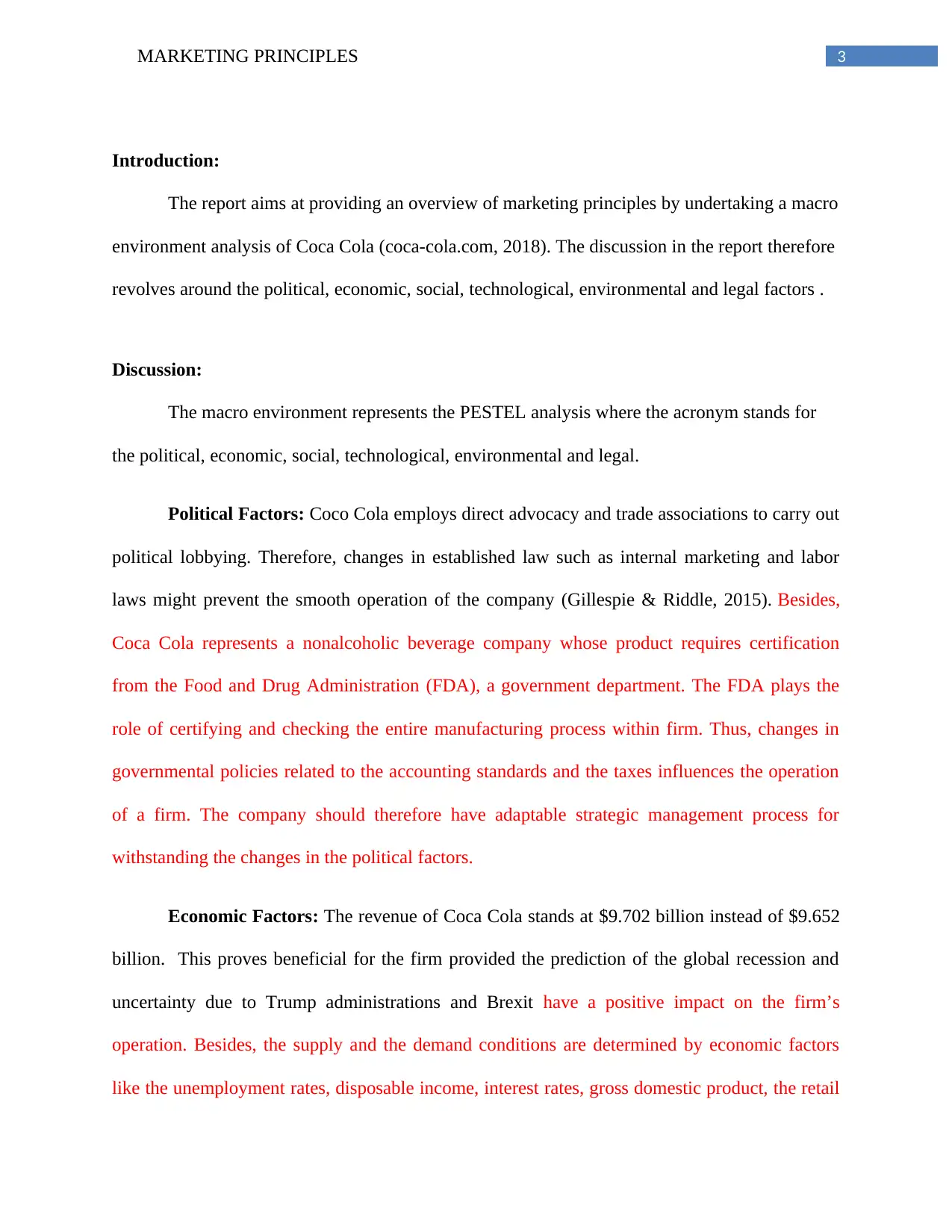
3MARKETING PRINCIPLES
Introduction:
The report aims at providing an overview of marketing principles by undertaking a macro
environment analysis of Coca Cola (coca-cola.com, 2018). The discussion in the report therefore
revolves around the political, economic, social, technological, environmental and legal factors .
Discussion:
The macro environment represents the PESTEL analysis where the acronym stands for
the political, economic, social, technological, environmental and legal.
Political Factors: Coco Cola employs direct advocacy and trade associations to carry out
political lobbying. Therefore, changes in established law such as internal marketing and labor
laws might prevent the smooth operation of the company (Gillespie & Riddle, 2015). Besides,
Coca Cola represents a nonalcoholic beverage company whose product requires certification
from the Food and Drug Administration (FDA), a government department. The FDA plays the
role of certifying and checking the entire manufacturing process within firm. Thus, changes in
governmental policies related to the accounting standards and the taxes influences the operation
of a firm. The company should therefore have adaptable strategic management process for
withstanding the changes in the political factors.
Economic Factors: The revenue of Coca Cola stands at $9.702 billion instead of $9.652
billion. This proves beneficial for the firm provided the prediction of the global recession and
uncertainty due to Trump administrations and Brexit have a positive impact on the firm’s
operation. Besides, the supply and the demand conditions are determined by economic factors
like the unemployment rates, disposable income, interest rates, gross domestic product, the retail
Introduction:
The report aims at providing an overview of marketing principles by undertaking a macro
environment analysis of Coca Cola (coca-cola.com, 2018). The discussion in the report therefore
revolves around the political, economic, social, technological, environmental and legal factors .
Discussion:
The macro environment represents the PESTEL analysis where the acronym stands for
the political, economic, social, technological, environmental and legal.
Political Factors: Coco Cola employs direct advocacy and trade associations to carry out
political lobbying. Therefore, changes in established law such as internal marketing and labor
laws might prevent the smooth operation of the company (Gillespie & Riddle, 2015). Besides,
Coca Cola represents a nonalcoholic beverage company whose product requires certification
from the Food and Drug Administration (FDA), a government department. The FDA plays the
role of certifying and checking the entire manufacturing process within firm. Thus, changes in
governmental policies related to the accounting standards and the taxes influences the operation
of a firm. The company should therefore have adaptable strategic management process for
withstanding the changes in the political factors.
Economic Factors: The revenue of Coca Cola stands at $9.702 billion instead of $9.652
billion. This proves beneficial for the firm provided the prediction of the global recession and
uncertainty due to Trump administrations and Brexit have a positive impact on the firm’s
operation. Besides, the supply and the demand conditions are determined by economic factors
like the unemployment rates, disposable income, interest rates, gross domestic product, the retail
Paraphrase This Document
Need a fresh take? Get an instant paraphrase of this document with our AI Paraphraser
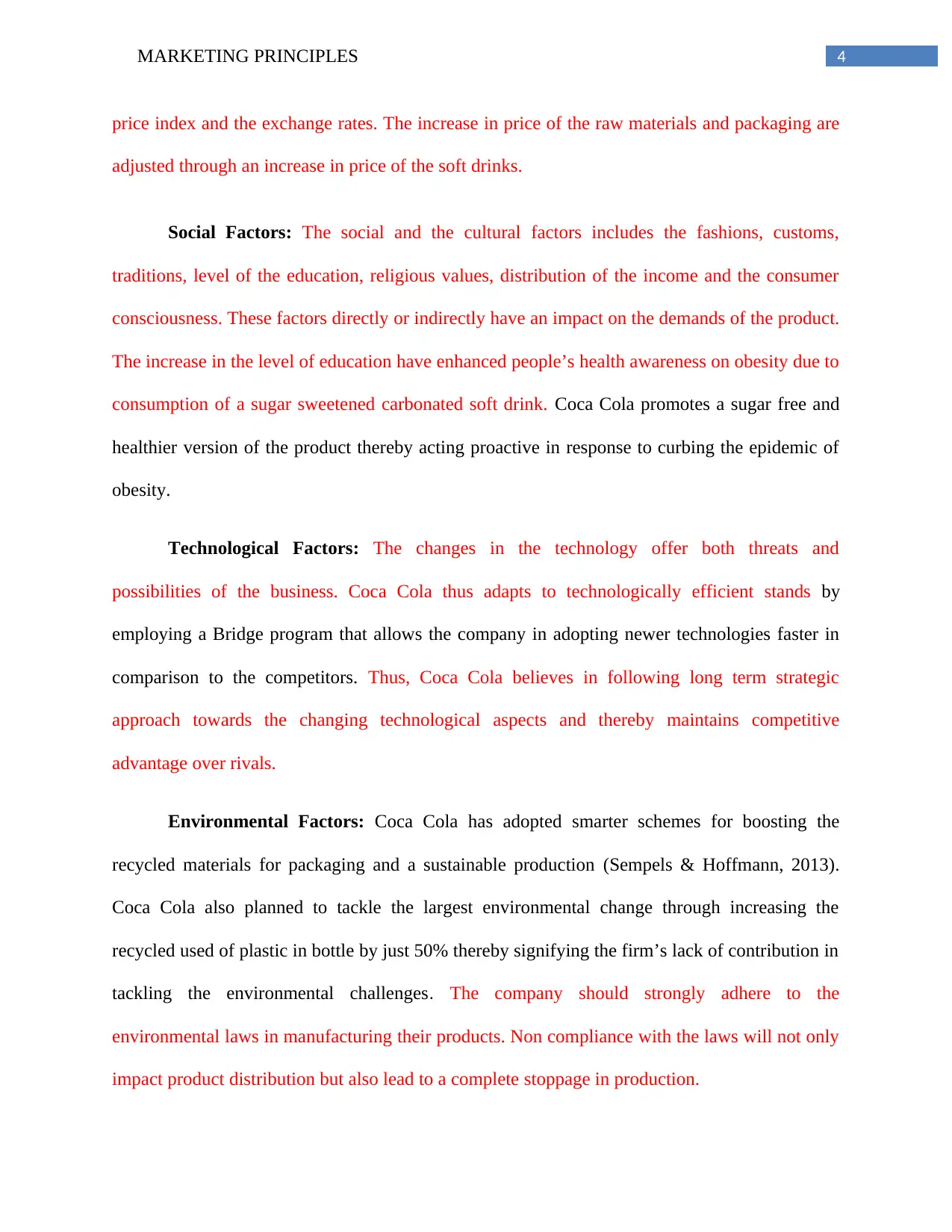
4MARKETING PRINCIPLES
price index and the exchange rates. The increase in price of the raw materials and packaging are
adjusted through an increase in price of the soft drinks.
Social Factors: The social and the cultural factors includes the fashions, customs,
traditions, level of the education, religious values, distribution of the income and the consumer
consciousness. These factors directly or indirectly have an impact on the demands of the product.
The increase in the level of education have enhanced people’s health awareness on obesity due to
consumption of a sugar sweetened carbonated soft drink. Coca Cola promotes a sugar free and
healthier version of the product thereby acting proactive in response to curbing the epidemic of
obesity.
Technological Factors: The changes in the technology offer both threats and
possibilities of the business. Coca Cola thus adapts to technologically efficient stands by
employing a Bridge program that allows the company in adopting newer technologies faster in
comparison to the competitors. Thus, Coca Cola believes in following long term strategic
approach towards the changing technological aspects and thereby maintains competitive
advantage over rivals.
Environmental Factors: Coca Cola has adopted smarter schemes for boosting the
recycled materials for packaging and a sustainable production (Sempels & Hoffmann, 2013).
Coca Cola also planned to tackle the largest environmental change through increasing the
recycled used of plastic in bottle by just 50% thereby signifying the firm’s lack of contribution in
tackling the environmental challenges. The company should strongly adhere to the
environmental laws in manufacturing their products. Non compliance with the laws will not only
impact product distribution but also lead to a complete stoppage in production.
price index and the exchange rates. The increase in price of the raw materials and packaging are
adjusted through an increase in price of the soft drinks.
Social Factors: The social and the cultural factors includes the fashions, customs,
traditions, level of the education, religious values, distribution of the income and the consumer
consciousness. These factors directly or indirectly have an impact on the demands of the product.
The increase in the level of education have enhanced people’s health awareness on obesity due to
consumption of a sugar sweetened carbonated soft drink. Coca Cola promotes a sugar free and
healthier version of the product thereby acting proactive in response to curbing the epidemic of
obesity.
Technological Factors: The changes in the technology offer both threats and
possibilities of the business. Coca Cola thus adapts to technologically efficient stands by
employing a Bridge program that allows the company in adopting newer technologies faster in
comparison to the competitors. Thus, Coca Cola believes in following long term strategic
approach towards the changing technological aspects and thereby maintains competitive
advantage over rivals.
Environmental Factors: Coca Cola has adopted smarter schemes for boosting the
recycled materials for packaging and a sustainable production (Sempels & Hoffmann, 2013).
Coca Cola also planned to tackle the largest environmental change through increasing the
recycled used of plastic in bottle by just 50% thereby signifying the firm’s lack of contribution in
tackling the environmental challenges. The company should strongly adhere to the
environmental laws in manufacturing their products. Non compliance with the laws will not only
impact product distribution but also lead to a complete stoppage in production.
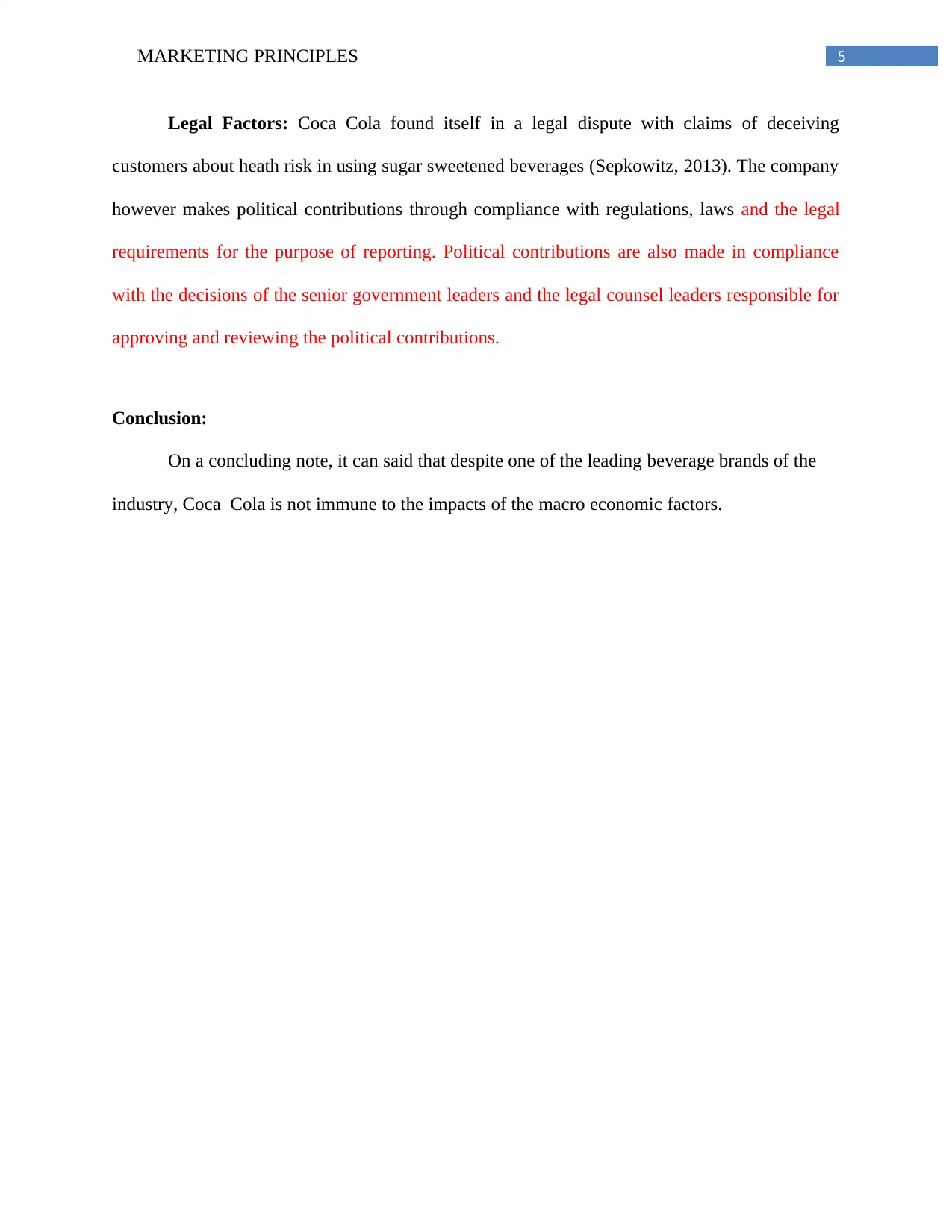
5MARKETING PRINCIPLES
Legal Factors: Coca Cola found itself in a legal dispute with claims of deceiving
customers about heath risk in using sugar sweetened beverages (Sepkowitz, 2013). The company
however makes political contributions through compliance with regulations, laws and the legal
requirements for the purpose of reporting. Political contributions are also made in compliance
with the decisions of the senior government leaders and the legal counsel leaders responsible for
approving and reviewing the political contributions.
Conclusion:
On a concluding note, it can said that despite one of the leading beverage brands of the
industry, Coca Cola is not immune to the impacts of the macro economic factors.
Legal Factors: Coca Cola found itself in a legal dispute with claims of deceiving
customers about heath risk in using sugar sweetened beverages (Sepkowitz, 2013). The company
however makes political contributions through compliance with regulations, laws and the legal
requirements for the purpose of reporting. Political contributions are also made in compliance
with the decisions of the senior government leaders and the legal counsel leaders responsible for
approving and reviewing the political contributions.
Conclusion:
On a concluding note, it can said that despite one of the leading beverage brands of the
industry, Coca Cola is not immune to the impacts of the macro economic factors.
⊘ This is a preview!⊘
Do you want full access?
Subscribe today to unlock all pages.

Trusted by 1+ million students worldwide
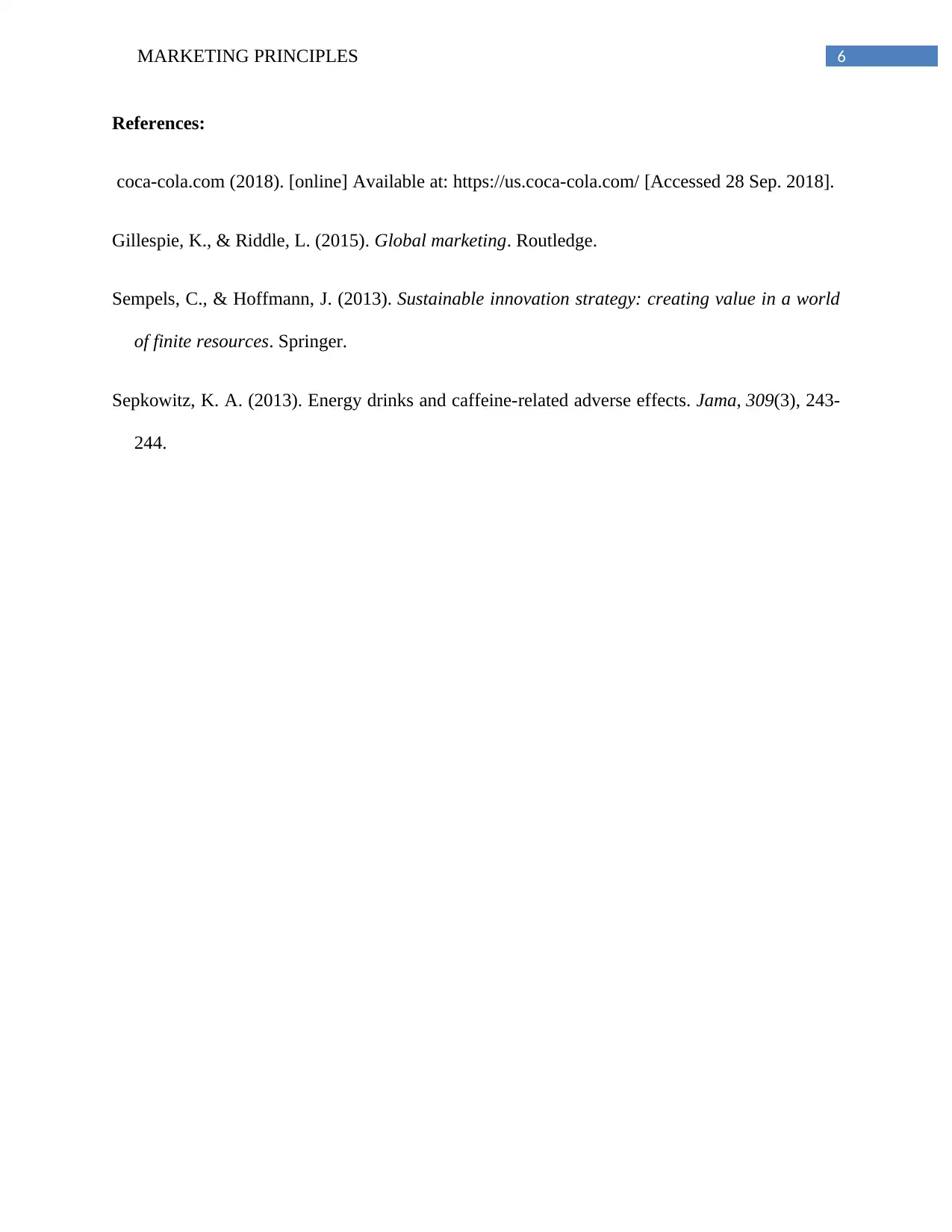
6MARKETING PRINCIPLES
References:
coca-cola.com (2018). [online] Available at: https://us.coca-cola.com/ [Accessed 28 Sep. 2018].
Gillespie, K., & Riddle, L. (2015). Global marketing. Routledge.
Sempels, C., & Hoffmann, J. (2013). Sustainable innovation strategy: creating value in a world
of finite resources. Springer.
Sepkowitz, K. A. (2013). Energy drinks and caffeine-related adverse effects. Jama, 309(3), 243-
244.
References:
coca-cola.com (2018). [online] Available at: https://us.coca-cola.com/ [Accessed 28 Sep. 2018].
Gillespie, K., & Riddle, L. (2015). Global marketing. Routledge.
Sempels, C., & Hoffmann, J. (2013). Sustainable innovation strategy: creating value in a world
of finite resources. Springer.
Sepkowitz, K. A. (2013). Energy drinks and caffeine-related adverse effects. Jama, 309(3), 243-
244.
1 out of 7
Related Documents
Your All-in-One AI-Powered Toolkit for Academic Success.
+13062052269
info@desklib.com
Available 24*7 on WhatsApp / Email
![[object Object]](/_next/static/media/star-bottom.7253800d.svg)
Unlock your academic potential
Copyright © 2020–2026 A2Z Services. All Rights Reserved. Developed and managed by ZUCOL.





